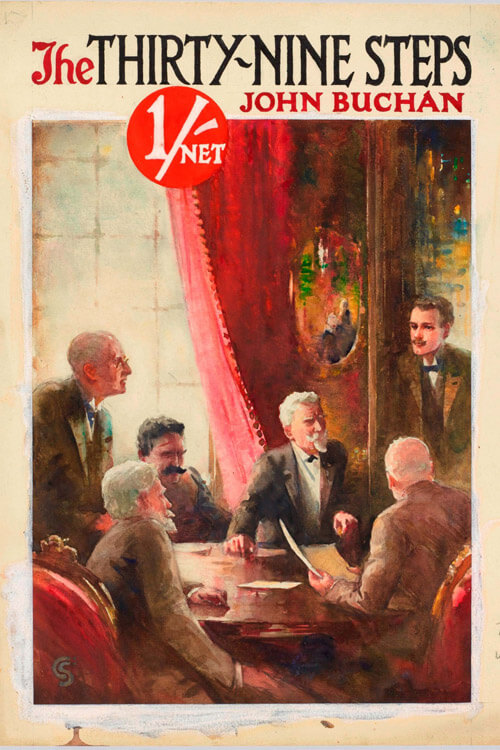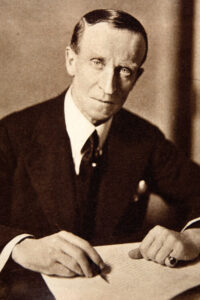
The Thirty-Nine Steps
The story’s narrator, Richard Hannay, arrives in London from Rhodesia early in 1914, having made a modest fortune as a mining engineer. Disillusioned with his uneventful life as a man about town, he is on the brink of resolving to leave England for good when a panicked neighbour, Franklin Scudder, knocks at the door of his flat in Portland Place. Scudder is a freelance journalist who claims to have uncovered a plot against the Premier of Greece, Constantine Karolides.
According to Scudder, Karolides is to be assassinated in London in a few weeks, on 15 June, an event which the plotters hope will trigger war in Europe. Fearing for his life, Scudder has gone to the trouble of faking his death and needs to disappear from view. Hannay permits him to hide in his flat and is horrified when, a few days later, he returns to find Scudder with a knife through his heart, now genuinely dead. Determined to warn the government of the plot but unwilling to go to the police for fear of being arrested for murder, Hannay escapes the building disguised as a milkman and takes a train to Scotland, intending to find a remote area where he can lie low. He brings the coded notebook in which Scudder had recorded his findings. Hannay alights at a rural station in the Galloway Hills, and a cat-and-mouse chase ensues as he evades both the plotters, who attempt to spot him on the open hillside from an aeroplane and the police. Deciphering Scudder’s notes, he learns that his adversaries are members of a German spy ring known as the “Black Stone” whose goal is to steal Britain’s naval defense plans before war. Hannay meets Sir Harry, landowner and local parliamentary candidate, and takes him into his confidence. Sir Harry promises to write to his godfather, Sir Walter Bullivant, Permanent Secretary at the Foreign Office, to warn him of the plot. Narrowly avoiding his pursuers, Hannay stumbles into a lonely cottage and finds himself face-to-face with the Black Stone’s leader. Hannay’s lies are convincing enough to leave the spies in doubt as to his true identity, and they lock him in a storeroom rather than killing him outright. Finding a cabinet full of explosives, Hannay uses his experience as a mining engineer to escape by blowing the window from its frame.
Eventually, he catches a train south, hoping to find Sir Walter Bullivant at his home in Berkshire. Sir Walter accepts the bulk of Hannay’s story but doubts that Karolides’ life is in danger. An urgent government phone call, however, informs him that Karolides is already dead. The two men travel to London, where Sir Walter is to host a high-level official meeting at his city townhouse. Hannay, now cleared of the Portland Place murder, is left to his own devices, but a general feeling of unease prompts him to call at Sir Walter’s house. He arrives just in time to see the First Sea Lord leaving; their eyes briefly meet, and Hannay recognizes him as one of the spies in disguise. Hannay breaks into the meeting, but by the time the deception is confirmed, the man is long gone, taking the naval secrets he has just learned.
Read or download Book
John Buchan
John Buchan, 1st Baron Tweedsmuir GCMG GCVO CH KStJ PC DL (26 August 1875 – 11 February 1940) was a Scottish novelist, historian, and Unionist politician who served as Governor General of Canada, the 15th since Canadian Confederation.
Biography
After a brief legal career, Buchan simultaneously began his writing career and his political and diplomatic careers, serving as a private secretary to the administrator of various colonies in southern Africa. He eventually wrote propaganda for the British war effort during the First World War. He was elected Member of Parliament for the Combined Scottish Universities in 1927. Still, he spent most of his time on his writing career, notably writing The Thirty-Nine Steps and other adventure fiction. In 1935, King George V, on the advice of Prime Minister R. B. Bennett, appointed Buchan to replace the Earl of Bessborough as Governor General of Canada, for which purpose Buchan was raised to the peerage. He occupied the post until he died in 1940. Buchan was enthusiastic about literacy and the development of Canadian culture, and he received a state funeral in Canada before his ashes were returned to the United Kingdom.
Buchan was born at today’s 18–20 York Place, a double villa now named after him, in Perth, Scotland. He was the first child of John Buchan – a Free Church of Scotland minister – and Helen Jane Buchan (née Masterson). He was brought up in Kirkcaldy, Fife, and spent many summer holidays with his maternal grandparents in Broughton in the Scottish Borders. There, he developed a love for walking and the local scenery and wildlife, often featured in his novels. The protagonist in several of his books is Sir Edward Leithen, whose name is borrowed from the Leithen Water, a tributary of the River Tweed. Buchan attended Hutchesons’ Boys’ Grammar School in Glasgow and was awarded a scholarship to the University of Glasgow at age 17, where he studied classics as a student of James Caddell, wrote poetry, and became a published author.
He moved on to study Literae Humaniores (the Classics) at Brasenose College, Oxford, with a junior William Hulme scholarship in 1895, where his friends included Hilaire Belloc, Raymond Asquith, and Aubrey Herbert. Buchan won the Stanhope Essay Prize in 1897 and the Newdigate Prize for poetry the following year. He also was elected president of the Oxford Union and had six of his works published. Buchan had his first portrait painted in 1900 by a young Sholto Johnstone Douglas around his graduation from Oxford.






